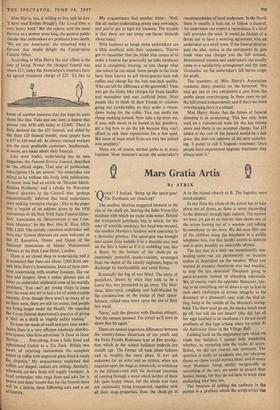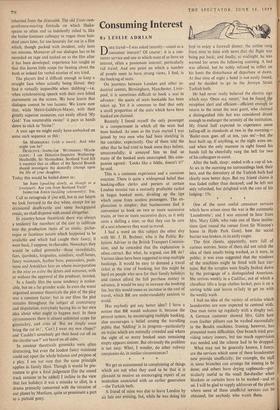Mars Gratia Artis
By STRIX vim!' I barked. 'Bring up the space-gun! The Earthmen are attacking!' - The smallest Martian staggered forward to the rim of the chalk-pit, bearing the Jules Verne-like machine with which we make soda-water. Behind the transparent polythene bag in which, for the sake of scientific accuracy, her head was encased, the smallest Martian's features were contorted in a demoniac grimace. The space-gun was brought into action (you wobble it in a staccato way and on the film it looks as if it is wobbling you, like a Bren). In the bottom of the chalk-pit an immensely powerful smoke-canister, scrounged from the depot of the county regiment, began to discharge its inexhaustible and acrid fumes.
Eventually the fog of war lifted. The party of picnickers, drawn by what they took to be a forest fire, was persuaded to go away. The Mar- tians, blear-eyed, coughing and half-blinded by the condensation on the inside of their space- helmets, rallied once more upon the site of their last stand.
'Sorry,' said the director with Etonian phlegm, 'but the camera jammed. I'm afraid we'll have to shoot that bit again.'
There are several important differences between the country-house theatricals of my youth and the Swiss Family Robinson type of film produc- tion which in the school holidays bedevils my middle age. The former all took place indoors and in roughly the same place. It was not unknown for an actor and an actress, when not required upon the stage at rehearsals, to withdraw to the billiard-room with the declared intention of running through a scene which neither of them felt quite happy about; but the whole cast were not continually being transported, together with all their stage-properties, from the chalk-pit at A to the ruined church at B. The logistics were much simpler.
In our films the whole of the action has to take place out of doors, as there is never (according to the director) enough light indoors. The nearest we have yet got to an interior shot shows one of the actors leaning out of a window and talking to somebody on the lawn. We did once film one of the children using the, telephone in a public telephone box, but that hardly counts as indoors and is quite possibly an indictable offence.
The fact that as a unit—an exceptionally mis- leading term—we are permanently on location makes us dependent on the weather. What you wanted in amateur theatricals was bad weather, to stop the less dedicated Thespians going to point-to-points instead of attending rehearsals. We, of course, want the opposite. Moreover, hav- ing to do everything out of doors is apt to lead to such stern challenges to artistic integrity as the discovery of a pheasant's nest, with the bird sit- ting, bang in the middle of the Martian's strong- hold. The show must go on; the smoke-bomb must go off; but will she not desert? (She did, but all her eggs hatched in an incubator.) I do not recall problems of this type arising when we acted At the Bathroom Door in the Village Hall.
Looking back on the stupendous epic which we made last holidays I cannot help wondering whether, in venturing into the realm of space- fiction, we did not overtax our resources. The question is really an academic one, for whatever theme we chose would overtax.them; and in many ways Martians, being readily recognisable as something of the sort, are easier to project than human beings, for they do not have to waste time explaining who they are. This business of putting the audience in the picture is a problem which the script-writer has inherited from the dramatist. The old Enter-two- gentlemen-meeting formula on which Shake- speare so often and so indolently relied is, like the butler-footman colloquy in vogue three hun- dred years later, far too leisurely for use in a film which, though packed with incident, only lasts ten minutes. Moreover all our dialogue has to be recorded on tape and tacked on to the film after it has been developed; experience has taught us that this leaves little scope for beating about the bush or indeed for verbal niceties of any kind.
The players find it difficult enough to keep a straight face when actually being filmed; they find it virtually impossible when `dubbing'—i.e. when synchronising speech with their own labial movements on the screen. We have learnt that dialogue cannot be too laconic. We know now that, while Metro-Goldwyn-Mayer, with their greatly superior resources, can easily afford `My God! You unutterable swine!' it pays us hands down to stick to `Swine!'
A year ago we might easily have embarked on some such sequence as this : SIR MARMAPLIKE (with a sneer): And who might you be?
• DETECTIVE - INSPECTOR WUTHERING - nEATH- CLIFFE : I am Detective-Inspector Wuthering- Heathcliffe, Sir Marmaduke. Scotland Yard felt it essential that an officer of the Special Branch should investigate the dastardly attempt upon the life of your daughter.
Today this would be boiled down to : SIR JOHN (speaking slowly, as though to a foreigner): Are you from Scotland Yard?
INSPECTOR JONES (nodding vehemently): Yes.
Call us retrograde if ion will, but in our hearts we look forward to the day when, except for an occasional death-rattle and some background music, we shall dispense with sound altogether.
In country-house theatricals there was always a tendency for members of the cast to infiltrate into the production items of an exotic, pictur- esque or facetious nature which happened to be available and which had caught their fancy; it went back, I suppose, to charades. Nowadays they would be called gimmicks—those swordsticks, fans, sjamboks, lorgnettes, scimitars, snuff-boxes, fancy waistcoats, feather boas, pomanders, posh- teens and Astrakhan hats on whose incorporation in the mise en scene the actors and actresses, with or without the approval of the producer, insisted.
In a family film the same tendency is notice- able, but on a far grander scale. In even the worst organised amateur theatricals the plot of the play was a constant factor; but in our films the plot remains throughout the subject of controversy and disputation, everybody having his or her own idea about what ought to happen next. In these circumstances there is almost unlimited scope for gimmickry, and cries of 'But we simply must bring the cat in 'Can't ,I wear my new chaps?' and `Couldn't somebody get their head cut off on the circular saw?' are heard on all sides.
In amateur theatricals gimmicks were often distracting, but even the loudest fancy waistcoat could not upset the whole balance and purpose of a play. I am not sure that the same principle applies in family films. Though it would be pre- mature to give a final judgement (for the sound track remains to be added) I incline to the view that last holidays it was a mistake to allot, in a drama primarily concerned with the invasion of our planet by Martians, quite so prominent a part to a piebald pony.



































 Previous page
Previous page